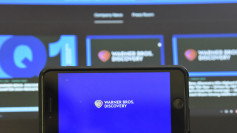Shares of pharmaceutical giants Novo Nordisk and Eli Lilly experienced significant declines on Wednesday following a report suggesting a potential link between their popular weight-loss drugs, Ozempic and Wegovy, and a rare eye condition that can cause sudden vision loss. The findings, stemming from a study conducted by Massachusetts Eye and Ear, have sparked concerns among investors and patients alike.
The study, which was published in JAMA Ophthalmology, indicated that semaglutide-the active ingredient in Ozempic and Wegovy-may significantly increase the risk of developing non-arteritic anterior ischemic optic neuropathy (NAION). This condition, often described as a stroke of the optic nerve, can lead to irreversible vision loss. The research found that diabetics taking semaglutide had a fourfold higher risk of developing NAION, while those using the drug for weight loss had a sevenfold increased risk.
The researchers at Massachusetts Eye and Ear began investigating last summer after diagnosing three patients with NAION within a single week, all of whom were taking semaglutide. The study analyzed records of over 17,000 patients treated since the release of Ozempic, identifying a significant increase in the risk of NAION among those on the drug.
"It is, in effect, a stroke of the optic nerve," explained Dr. Joseph Rizzo, the senior study author and director of neuro-ophthalmology at Mass Eye and Ear. He emphasized the need for further research to confirm the findings, noting, "What it does show is an association between taking semaglutide and developing this condition where you lose vision."
The potential link between semaglutide and vision loss has prompted a cautious response from medical professionals. Dr. Andrew Lee, a neuro-ophthalmologist at Houston Methodist Hospital, remarked, "The question is always whether this is a causal association or merely an association alone." He noted that while some of his patients on semaglutide had developed NAION, it remains unclear whether the drug directly caused the condition.
People with Type 2 diabetes are already at increased risk for vision problems, including NAION and diabetic retinopathy, which is the leading cause of blindness in adults. Additionally, conditions such as sleep apnea and hypertension, more common in individuals with obesity, are known risk factors for NAION. This complicates the ability to definitively link semaglutide to the condition without further studies.
The study's findings have stirred debate in the medical community. Dr. Susan Mollan, a neuro-ophthalmologist at the University Hospitals Birmingham in the UK, suggested that GLP-1 drugs like semaglutide, which help control blood sugar, could paradoxically worsen diabetic retinopathy temporarily. This could potentially explain the increased risk of NAION observed in the study.
In response to the study, Novo Nordisk issued a statement emphasizing that the research does not establish a definitive link between semaglutide and NAION. "Patient safety is a top priority for Novo Nordisk, and we take all reports about adverse events from the use of our medicines very seriously," said a company spokesperson.
Despite the alarming findings, some healthcare professionals are not changing their prescribing practices. Dr. Shauna Levy, medical director of the Tulane Bariatric Center in New Orleans, stated, "As for now, the risk still seems low." She advised patients to consult with their doctors if they have concerns about the medication.
The news has had a notable impact on the stock market. Novo Nordisk shares fell nearly 4%, while Eli Lilly's shares dropped more than 1%. Both companies have heavily invested in the development and marketing of these drugs, which have become popular treatments for both diabetes and weight loss.






